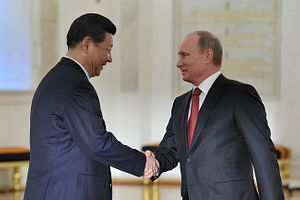China has been increasingly willing to help countries experiencing financial distress. This is part of a larger attempt to follow President Xi Jinping’s desire to make China “more engaged with the world.” Stepping in to help Russia would be another notch in China’s bailout belt. However, despite China’s increased economic support for Russia, China’s support is likely to remain indirect and limited.
Chinese bank loans and natural resource imports have provided Russia with some substantial economic advantages. Despite energy demand sinking to its lowest level since 1992, China’s imports from Russia have climbed in price and volume. This has been accompanied by Beijing’s promises for substantial infrastructure projects and long-term agreements. Likewise, several Chinese banks, including the Export-Import Bank of China, Bank of Harbin, China Export & Credit Insurance, and China Finance Strategies Investment Holding, have agreed to provide $13.8 billion in credit facilities and loans to Russian banks. China has even agreed to shoulder the larger part of a $242 billion high-speed rail project between Beijing and Moscow.
China has trumpeted these measures. “Together we have carefully taken care of the tree of Russian-Chinese relations,” Xi Jinping said at a meeting with Putin at the Asia Pacific Economic Cooperation summit in Beijing last November. “Now fall has set in, it’s harvest time, it’s time to gather fruit.”
China has signed two natural gas deals with Russia that could account for as much as 17 percent of China’s gas consumption by 2020, according to research by Nomura Holdings.
But despite China’s significant contribution to Russian trade, bank loans, and the overall bilateral relationship – and the quid pro quo in energy deals – China’s assistance would not be enough to support the Russian economy. Currently, China provides nowhere near the support of the European Union, whose foreign direct investment accounts for 75 percent of Russia’s total inflow. The substantial finances provided by China are still only less than 10 percent of the $265 billion in loans and bonds that Russian companies need to repay.
Moreover, even if China could provide Russia with substantial financing during a crisis, China cannot meet Russia’s requirements for energy technology. Russia provides China with almost one-third of its global gas supplies and unconventional gas reserves, which analysts estimate are ten times larger than those in all of Europe. But it is reliant on Western technology for energy extraction and the development of that process – technologies that are essential to keeping the Russian economy above water. China has a lot of money, but it doesn’t have the advanced technology needed to tap into those hard-to-reach and dangerous energy-rich enclaves in the Arctic and Eastern Siberia.
To date, China has only made a series of small gestures through its government agencies and state firms. A substantial bailout has yet to occur. In December last year, Premier Li Keqiang visited Astana, capital of Kazakhstan, and promised further aid. “To help counteract an economic slowdown, China is ready to provide financial aid to develop cooperation,” he said during his visit.
Five days later, Russia responded with ambivalence. “Russia isn’t in talks with China about any financial aid,” said Dmitry Peskov, a spokesman for President Vladimir Putin. Putin has hinted at further energy support to China through natural gas contracts. “It will be very profitable for Russia,” Putin noted last year.
Just as Russia has been non-committal on China’s offer of a partnership, China’s political support for Russia – notable, over the Ukraine crisis – remains cautious. This is likely to be a calculated stance, as China cannot afford to break with the West. It would prefer to bridge the gap between Russia and the West. The two countries have much to offer each other but not enough to warrant to elope.
China can offer Russia either with a direct bailout or indirect financing via an agreement through the Shanghai Cooperation Organization, formed in 2001 between Russia, China and other former Soviet states. The bailout would most likely occur through the New Development Bank, also known as the BRICS Development Bank. China is likely to avoid direct investment, as this could cause international fallout. Ultimately, China would benefit from Russo-U.S. reconciliation, but in the meantime it will use indirect methods of aiding Russia because it cannot afford to alienate the West.
Andrew Collier, Arthur Peng and Abigail Collier are with Orient Capital Research, Hong Kong.

































